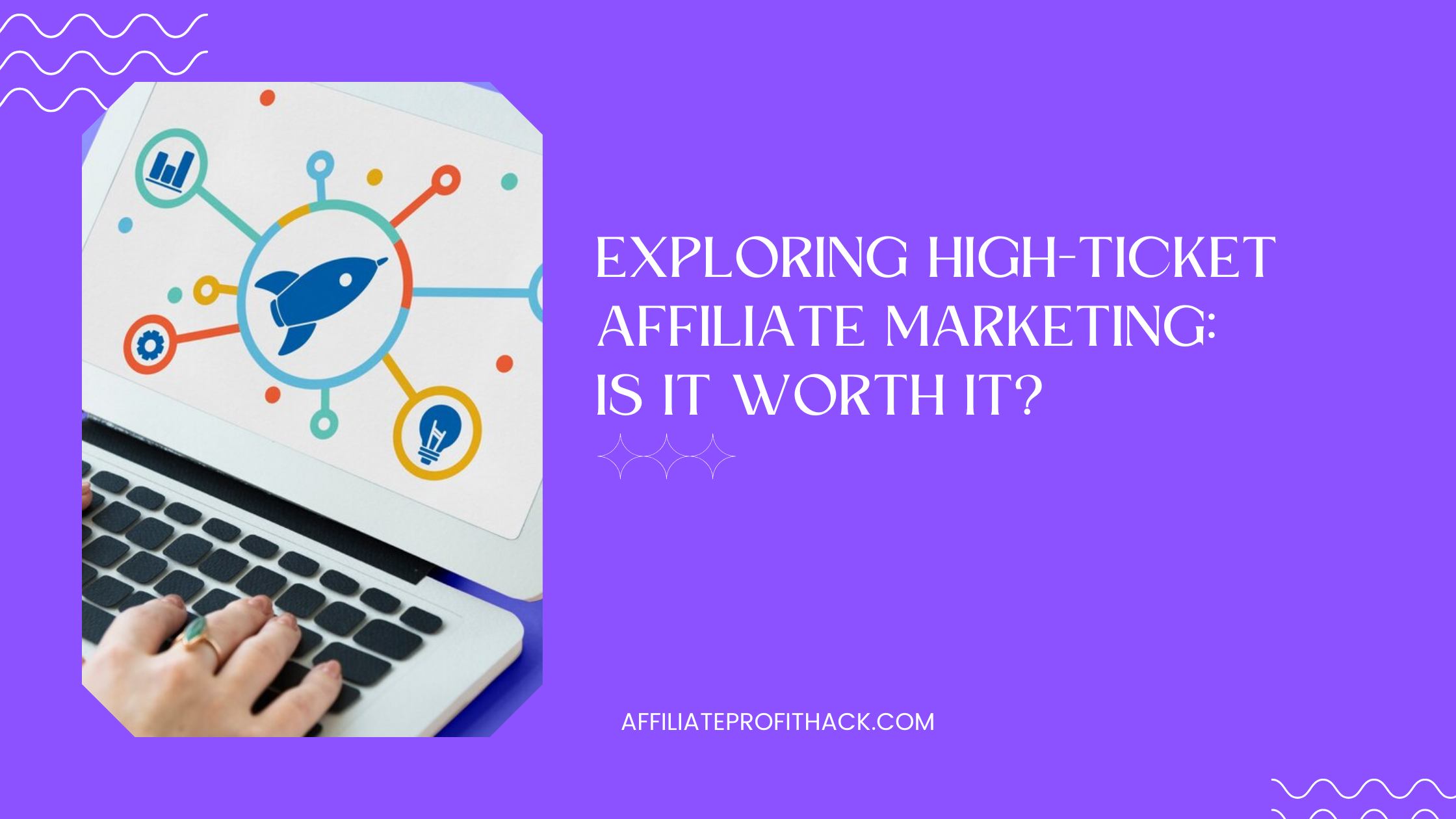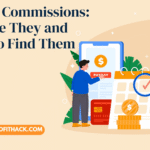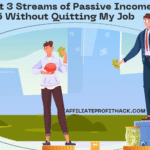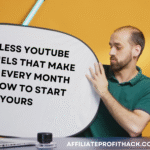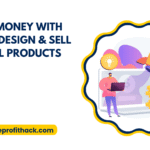Welcome to my article “Exploring High-Ticket Affiliate Marketing: Is It Worth It?”.
Imagine earning a hefty $1,000 commission from a single sale while sipping your morning coffee. Sounds dreamy, right? That’s the allure of high-ticket affiliate marketing—a world where you trade penny commissions for dollar bills (and maybe a few hundred of them at a time). But before you start shopping for yachts, let’s pump the brakes and dig deeper. High-ticket affiliate marketing might sound like the golden goose of passive income, but is it really as glamorous as it seems? Spoiler alert: It’s not just about selling expensive stuff.
So, is it worth the climb? In this article, we’re unpacking everything you need to know about high-ticket affiliate marketing: the good, the bad, and the downright tricky. Whether you’re dreaming of making it big in this niche or just curious if this is the right path for you, keep reading. By the end, you’ll know if it’s time to dive into the high-ticket game—or stick to those trusty Amazon Associates commissions. Let’s get started!
My Best Recommended & Proven Way to Make $100-$300 Daily – Watch This FREE Video to START >>>
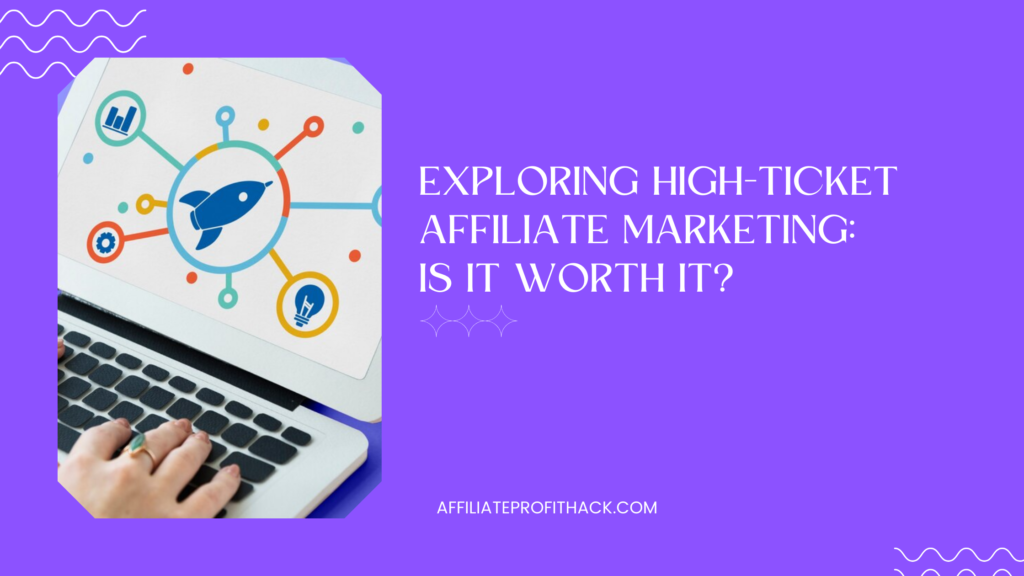
What is High-Ticket Affiliate Marketing?
If traditional affiliate marketing is like selling candy bars at a school fundraiser, high-ticket affiliate marketing is more like selling five-course dinners at a luxury restaurant. It’s the same basic concept—you promote a product and earn a commission when someone buys it—but in this case, the products come with a premium price tag (and a way juicier commission). Instead of earning $5 for a sale, you could be pocketing $500, $1,000, or even more from a single transaction. Not too shabby, right?
High-ticket affiliate marketing focuses on high-value items like online courses, luxury goods, SaaS subscriptions, or coaching programs. Think $1,000 laptops, $5,000 all-inclusive retreats, or enterprise-level software that costs more than your rent. These aren’t impulse buys; they’re investments. And that’s where the challenge—and opportunity—lie. Convincing someone to drop big bucks requires more effort than saying, “Hey, check out this cool $10 gadget.” You need to build trust, provide value, and often hold their hand through the decision-making process.
So, what makes high-ticket affiliate marketing so appealing? Well, it’s all about working smarter, not harder. Instead of hustling to make 100 sales at $10 each, you can focus on closing a few high-ticket deals to reach the same (or better) income. Plus, there’s a certain thrill in promoting top-tier products that make people go, “Wow, I actually need this!” But let’s be clear: just because the rewards are bigger doesn’t mean it’s a shortcut to success. It takes strategy, patience, and sometimes, a little creative flair to succeed in this space.
In essence, high-ticket affiliate marketing is for those who want to play in the big leagues. It’s challenging, rewarding, and—when done right—can be a total game-changer. Ready to dive deeper? Let’s talk pros and cons!
Pros of High-Ticket Affiliate Marketing
Let’s face it—who doesn’t love the idea of earning a few hundred (or even a few thousand) dollars with just one sale? That’s the shiny allure of high-ticket affiliate marketing. But beyond the obvious dollar signs, there are some solid reasons why this approach is worth considering if you’re ready to level up your affiliate game. Let’s break down the perks, shall we?
1. Bigger Commissions with Less Effort (Sort Of):
The most obvious benefit? You don’t have to sell a truckload of products to make a decent income. If you’re earning $1,000 per sale, landing five customers in a month can rival—or surpass—the income of someone promoting low-ticket items to hundreds of buyers. It’s like swapping out a hamster wheel for a comfy lounge chair. Sure, the hustle’s still there, but you’re working smarter, not harder.
2. Premium Products Equal Premium Credibility:
High-ticket affiliate marketing often involves promoting top-tier brands or exclusive services. Think luxury watches, advanced tech solutions, or transformative coaching programs. When you align yourself with these premium offerings, you’re not just boosting your earnings—you’re also elevating your personal brand. People will start seeing you as the go-to source for the good stuff, not just another affiliate pushing random products.
My Best Recommended & Proven Way to Make $100-$300 Daily – Watch This FREE Video to START >>>
3. Opportunities for Long-Term Partnerships:
When you promote high-ticket products, you’re likely working with vendors who are serious about their business. These brands are more invested in building lasting relationships with their affiliates, offering better support, personalized resources, and even higher commissions over time. In other words, you’re not just another number in their affiliate database—you’re a partner.
4. Less Volume, More Focus:
While low-ticket affiliate marketing often feels like a numbers game (sell, sell, SELL!), high-ticket marketing lets you shift gears. With fewer sales to worry about, you can focus on creating high-quality content and nurturing relationships with your audience. It’s like trading in fast food for a gourmet meal—you spend more time crafting the experience, but the payoff is way more satisfying.
5. It’s a Confidence Booster:
Closing a high-ticket sale is an adrenaline rush like no other. Knowing that you’ve convinced someone to trust you with their hard-earned money for a premium product? That’s next-level validation of your skills. Plus, every big sale adds fuel to your motivation, keeping you excited to tackle the next opportunity.
Sure, it’s not all sunshine and rainbows (we’ll get to the challenges soon), but the potential benefits of high-ticket affiliate marketing are undeniably enticing. So, if you’re ready to trade small potatoes for big fish, this might just be your calling. Onward to the cons—because every good story has a plot twist!
Cons and Challenges of High-Ticket Affiliate Marketing
High-ticket affiliate marketing might sound like the perfect gig—who wouldn’t want to earn $1,000 commissions? But like any venture promising big rewards, it comes with its fair share of hurdles. Let’s talk about the less glamorous side of the high-ticket world—the kind that makes you question if you’re really cut out for this (spoiler: you probably are, but let’s manage expectations).
1. It’s Not a Quick Sale Game:
Selling a $20 phone case? Most people won’t think twice. Selling a $2,000 online course? Now you’re talking about sleepless nights, bank account balances, and a lot of “Let me think about it” responses. High-ticket sales require patience, persistence, and sometimes a little pep talk for yourself after a rejection. Buyers need convincing, and that takes time—and strategy.
2. The Competition is Fierce:
Where there’s big money, there are big players. Many high-ticket affiliate programs attract seasoned marketers who’ve been around the block (and probably own the block, too). Competing with these pros can feel like bringing a water gun to a laser tag arena. You’ll need to sharpen your skills, find unique angles, and outshine competitors who might already have a head start.
3. Target Audience is Smaller:
Not everyone is ready to drop thousands of dollars on a product or service, no matter how amazing it is. Your audience for high-ticket items is naturally smaller, which means you’ll need to dig deep into niche marketing. Finding and connecting with the right people is more challenging than throwing spaghetti at the wall and seeing what sticks.
4. Higher Stakes with Paid Advertising:
Sure, you can use organic traffic (blog posts, YouTube videos, etc.) to promote high-ticket products, but many marketers rely on paid ads to speed up the process. Here’s the catch: running ads for high-ticket products isn’t cheap. A poorly planned campaign can drain your budget faster than you can say “return on investment.” It’s high risk, high reward—and sometimes, high frustration.
5. More Effort to Build Trust:
Let’s be real: no one’s forking over thousands of dollars because they saw a flashy banner ad. High-ticket affiliate marketing demands trust—and lots of it. You’ll need to create in-depth product reviews, share success stories, and provide valuable insights to convince potential buyers that this is the real deal. It’s like building a relationship; you can’t skip straight to the “buy me a house” phase.
6. Rejection Hits Harder:
In the low-ticket world, losing a $10 sale is barely a blip on your radar. But when someone backs out of a $5,000 purchase? Oof, that stings. High-ticket affiliate marketing is a rollercoaster, and the emotional ups and downs can be a challenge to navigate.
Despite these challenges, don’t let the cons scare you away. High-ticket affiliate marketing isn’t for the faint of heart, but it’s also not impossible. With the right mindset, strategies, and a willingness to learn from setbacks, you can overcome these obstacles and cash in on the big-ticket rewards. Up for the challenge? Let’s move on to how you can succeed in this competitive space.
High-Ticket vs. Low-Ticket Affiliate Marketing
Affiliate marketing comes in two main flavors: low-ticket and high-ticket. Think of it like choosing between a fast-food burger and a gourmet steak dinner. Both fill you up, but they cater to different cravings (and budgets). So, which one should you go for? Let’s break down the key differences to help you decide if you’re more of a volume seller or a high-roller at heart.
1. Earnings Per Sale: The Big (and Obvious) Difference
In low-ticket affiliate marketing, you’re making smaller commissions—maybe $5 to $50 per sale. These are everyday items: books, gadgets, or budget-friendly services. High-ticket affiliate marketing, on the other hand, deals with products or services where commissions can range from $500 to $5,000 or more. The appeal here is clear: fewer sales, bigger payouts. With low-ticket, you’re aiming for quantity; with high-ticket, it’s all about quality (and by “quality,” we mean big checks).
2. Conversion Rates: Speed vs. Strategy
Selling low-ticket items is usually a faster process. These products are cheaper, so customers don’t spend hours agonizing over whether they should buy. It’s a quick “add to cart” and done. High-ticket products? Not so much. These purchases involve more thought, research, and trust-building. You’ll need to invest time in educating your audience and walking them through the decision-making process. Essentially, low-ticket is speed dating; high-ticket is a full-blown courtship.
My Best Recommended & Proven Way to Make $100-$300 Daily – Watch This FREE Video to START >>>
3. Marketing Approach: Spray and Pray vs. Precision Targeting
Low-ticket marketing often feels like throwing a handful of seeds into the wind and hoping some sprout. Social media posts, quick blogs, and impulse-driven ads are your best friends here. High-ticket, however, requires laser focus. You’re crafting in-depth content like webinars, detailed reviews, and sales funnels to nurture leads over time. It’s less about quick wins and more about playing the long game.
4. Audience Size and Demographics
Low-ticket products appeal to a broader audience because they’re affordable and accessible. Everyone can justify spending $10 on a new gadget or ebook. High-ticket products, by contrast, have a smaller, more specific audience. You’re targeting people who are willing—and able—to spend big on premium items. It’s not just about marketing the product; it’s about finding the right people to market it to.
5. Emotional Payoff: Instant Gratification vs. Long-Term Wins
Let’s not discount the emotional aspect here. In low-ticket marketing, the wins come quickly—you’re making sales daily (hopefully), which feels great. High-ticket marketing is slower, but when that sale lands, it’s a fist-pump moment like no other. It’s the difference between getting a handful of small gifts throughout the year or receiving one giant, jaw-dropping present on your birthday.
Which One is Right for You?
Here’s the thing: neither is inherently better than the other. Low-ticket affiliate marketing is perfect for beginners or those who want consistent, smaller wins. It’s also less risky, as you’re not pouring time and money into convincing someone to make a huge purchase. High-ticket, on the other hand, is for marketers ready to take on a challenge, invest in their skills, and reap the rewards of fewer—but more impactful—sales.
At the end of the day, the choice between high-ticket and low-ticket affiliate marketing comes down to your goals, resources, and patience level. Do you want quick wins and steady progress, or are you ready to play big for the chance at massive payouts? Whatever your answer, there’s no wrong choice—just your next adventure.
How to Succeed in High-Ticket Affiliate Marketing
High-ticket affiliate marketing is like stepping into the big leagues of affiliate marketing. The stakes are higher, the audience is pickier, and the competition is fiercer. But don’t let that scare you—it’s also where the rewards are worth the hustle. To succeed in this game, you need more than luck and a decent Wi-Fi connection. You need strategy, patience, and a sprinkle of marketing magic. Here’s how to crush it in the high-ticket world.
1. Choose the Right Niche (Hint: It’s Not “Anything Expensive”)
Not all high-ticket products are created equal, and not all niches will suit your expertise or audience. Start by focusing on a niche that you’re genuinely interested in and that offers high-value products. Are you into tech? Look at premium software or gadgets. Passionate about self-improvement? Explore coaching programs or online courses. The key is to choose a niche where people are willing to spend big—and trust you to guide them.
2. Build Authority and Trust (AKA Your Secret Sauce)
Here’s the thing: no one’s dropping $3,000 on a product because you slapped an affiliate link on your blog. High-ticket buyers need to believe in you before they believe in what you’re selling.
- Create in-depth content like product reviews, video testimonials, and case studies.
- Share your personal experiences with the product if possible. Authenticity sells.
- Engage with your audience through comments, emails, or live webinars to show them you’re not just another faceless affiliate.
Remember, in high-ticket marketing, trust isn’t just important—it’s everything.
3. Master the Art of Sales Funnels
In high-ticket affiliate marketing, your average “Buy Now” button won’t cut it. You need a well-crafted sales funnel that nurtures potential buyers and walks them through the decision-making process.
- Start with awareness: Use blog posts, videos, or ads to introduce the product and its benefits.
- Educate and engage: Offer lead magnets like free ebooks or webinars to build your email list and provide value.
- Close the sale: Use email sequences, live Q&As, or follow-up consultations to help prospects take the leap.
Think of your sales funnel as your wingman—it smooths out the buyer’s journey and increases your chances of sealing the deal.
4. Leverage Paid Advertising (Carefully)
Organic traffic is great, but it’s not always enough to scale high-ticket affiliate marketing. Paid ads on platforms like Google, Facebook, or Instagram can help you reach your target audience faster. But—and this is a big but—don’t go in blind.
- Test your ads on a small budget before scaling up.
- Target your audience precisely using keywords, interests, and behaviors.
- Focus on retargeting: people are more likely to buy after seeing the product multiple times.
Paid advertising can be a game-changer, but it’s also risky. Treat your ad budget like an investment, not a gamble.
5. Pick the Right High-Ticket Affiliate Programs
Not all high-ticket affiliate programs are worth your time. Look for ones that:
- Offer high commissions (20% or more is ideal for high-ticket products).
- Have a proven track record of conversions.
- Provide marketing support, such as training, creatives, or sales materials.
Some popular programs include Clickfunnels, Kajabi, and luxury travel packages. But don’t just pick what’s popular—choose what aligns with your niche and audience.
6. Stay Patient and Persistent
Here’s the harsh truth: high-ticket affiliate marketing is not an overnight success story. It takes time to build your audience, nurture trust, and refine your strategies. You’ll face rejections, dry spells, and moments when you wonder if it’s worth it. Spoiler: it is. Stay consistent, learn from failures, and celebrate every win—big or small.
Succeeding in high-ticket affiliate marketing isn’t about luck; it’s about showing up, staying strategic, and putting in the work. If you’re ready to combine effort with ambition, the rewards are waiting for you on the other side. Now, go get those commissions!
Conclusion
So, is high-ticket affiliate marketing the golden goose of passive income, or just a fancy buzzword? The answer, like most things in life, isn’t black and white—it’s more of a “yes, but…” situation. Yes, high-ticket affiliate marketing can be insanely rewarding, offering commissions that make your bank account do a happy dance. But it’s not a walk in the park (unless your idea of a “walk” involves climbing uphill with a backpack full of rocks).
The truth is, succeeding in this space takes patience, strategy, and a willingness to adapt. You’re not just selling products—you’re building trust, crafting compelling content, and targeting an audience that’s ready to invest in premium solutions. It’s not about making a quick buck; it’s about playing the long game for massive payoffs.
And yes, there will be challenges. You’ll face rejections, spend hours tweaking sales funnels, and possibly shed a tear or two over a failed ad campaign. But every obstacle is a stepping stone toward mastering the art of high-ticket affiliate marketing. With the right approach, you can turn those hurdles into victories—and those victories into high-ticket commissions.
My Best Recommended & Proven Way to Make $100-$300 Daily – Watch This FREE Video to START >>>
Ultimately, whether high-ticket affiliate marketing is “worth it” depends on you. Are you willing to put in the work? Can you commit to building relationships and creating value for your audience? If the answer is yes, then you’ve got what it takes to thrive in this exciting (and lucrative) niche. So, roll up your sleeves, dive in, and start chasing those high-ticket dreams. Your future self—and your bank account—will thank you!
Thank you for reading my article “Exploring High-Ticket Affiliate Marketing: Is It Worth It?” till the end. Hope it helped you. See you with another article.
